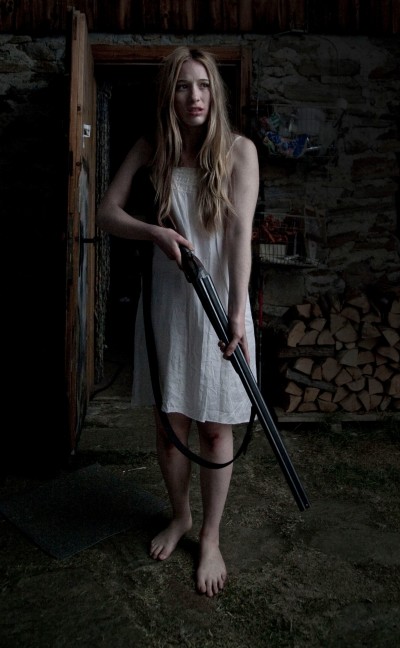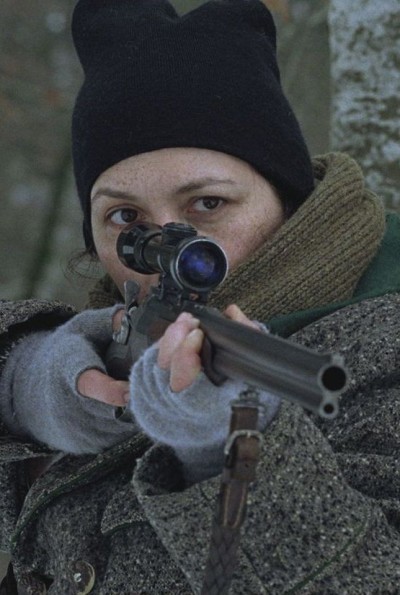★★
“The hills are alive…”
 Featuring some of the most luscious landscapes I’ve ever seen, unfortunately, that’s easily the best this Austrian film has to offer. While certainly ambitious, in its attempt to sustain an entire feature-length narrative with little more than a few lines of dialogue – and even those are largely superfluous – it brings home why talking movies talk. Too much here is unexplained, leaving you with an irritating series of unconnected events, whose motivation remains forever opaque.
Featuring some of the most luscious landscapes I’ve ever seen, unfortunately, that’s easily the best this Austrian film has to offer. While certainly ambitious, in its attempt to sustain an entire feature-length narrative with little more than a few lines of dialogue – and even those are largely superfluous – it brings home why talking movies talk. Too much here is unexplained, leaving you with an irritating series of unconnected events, whose motivation remains forever opaque.
It begins with two small children witnessing the death of their father in a shooting incident. Several years later, the girl, now a young woman (Lowe), she is attacked while bathing in a mountain spring by a lascivious local man. Her mother dies shortly after, leaving her and her younger brother (Harnisch) without protection, though she continues going in to collect their weekly allowance. The man shows up, with two friends, at their remote cabin, and the girl is assaulted again. A social worker (McCrudden) has been alerted to the childrens’ situation, but when she shows up and starts looking for them, the local men decide they need to silence all the witnesses to their crimes. That won’t necessarily be as easy it seems.
Actually, I didn’t mind the lack of dialogue too much; in some ways, it was a refreshing antidote to a certain type of film (hello, Quentin Tarantino), which thinks its characters can never stop flapping their lips for a moment. However, it doesn’t feel like the (unfortunately-named) director Blunder, the script, or the actors, realized they need to step up their game in the absence of dialogue, and use non-verbal elements to tell the story instead. That never happens, and although the basics are never unclear, this isn’t the case for important elements, such as who kills their father, and why he returns to play a pivotal – indeed, bordering on deus ex machina – role at the end. The setting is deliberately kept ambiguous: what little dialogue there is, is in English, yet the backdrop is unlike any English-speaking country with which I’m familiar.
As noted, the performances are also problematic; Lowe likely comes off best, perhaps because she has most screen time, which allows her character to develop a little further. Certainly, no-one else gives anything even approaching a memorable portrayal, with neither the villains nor the social worker appearing to be more than plot points, on which things build to an extended, largely forgettable climax in the woods. I have to say though: as a commercial for the Austrian Tourist Board, it’s entirely successful, even if, going by this, the native residents may need to work on their interpersonal skills a bit. When the on-screen action loses your interest, as it almost certainly will at some point or other, you can just sit back and admire the Alps instead.
Dir: Markus Blunder
Star: Sophie Lowe, Maximilian Harnisch, Gustaf Skarsgård, Annica McCrudden





 This is a very different kind of GWG film: indeed, it could almost be called an inaction heroine movie. It starts from a very simple presence. A woman (Gedeck) wakes up in a cabin in the Austrian Alps. When she tried to head to a nearby village, the path is blocked by an unseen, impenetrable barrier that has sprung up overnight, and now defines the boundary of her world. Everyone outside is dead. What do you do? How do you survive, both short- and long-term? Could you handle the loneliness? Can you retain your humanity, when you are, apparently, the only human being left?
This is a very different kind of GWG film: indeed, it could almost be called an inaction heroine movie. It starts from a very simple presence. A woman (Gedeck) wakes up in a cabin in the Austrian Alps. When she tried to head to a nearby village, the path is blocked by an unseen, impenetrable barrier that has sprung up overnight, and now defines the boundary of her world. Everyone outside is dead. What do you do? How do you survive, both short- and long-term? Could you handle the loneliness? Can you retain your humanity, when you are, apparently, the only human being left?